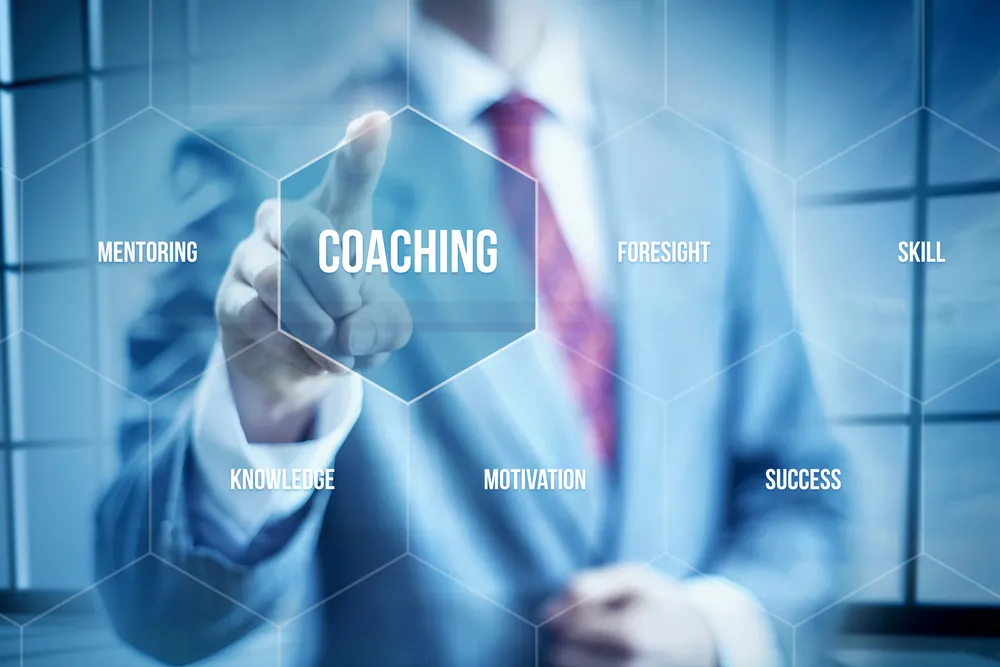
Organizational Coaching
Personal growth and development is a path that makes sense with professional guidance and support. At Roma Group, we are with you on this path with over a decade of experience in coaching and consulting. We help you through a variety of programs such as Footsteps and Bridges events, individual coaching sessions, and the Romaxt and Romatalk podcasts.

Organizational Coaching Services: What is it like?
The selection of educational content and its program must be done after a careful needs assessment. A correct needs assessment is the first step towards educational effectiveness. Then, the way of presenting the educational experience in a practical and interactive way will ensure that the individual has gained first-hand experience and is more prepared to apply what he has learned in the field of practice. It is necessary that for the effectiveness of education, there are measures to be considered in performance evaluation programs and that the individual has an external motivator in addition to self-aware internal motivation to apply the teachings. Retraining sessions, practice or in-action guidance are the guide and guarantee of the implementation of education.

The many challenges in today's world have increased attention to organizational coaching as an effective approach. In today's fast-paced and dynamic business world, organizations are faced with challenges such as fierce competition, technological changes, and growing employee expectations more than ever before. In such circumstances, how can an organization be led towards growth and productivity? The answer to this question lies in organizational coaching.
According to research conducted by the International Coach Federation, organizations that have implemented coaching programs as part of their culture have witnessed a 70% improvement in individual and team performance. For example, large companies such as Google and Microsoft have been able to significantly increase their employees' innovation, engagement, and productivity by implementing coaching programs.
Organizational coaching is not only a tool for improving individual skills, but as a macro strategy, it enables organizations to better adapt to environmental changes and gain a sustainable competitive advantage.
Definition of Organizational Coaching
Organizational coaching is a process in which managers, leaders, and employees develop their skills and achieve better performance through structured and interactive sessions. This process is carried out by professional coaches who use various techniques to develop employees' abilities.
6 Types of Organizational Coaching in the Workplace
Workplace coaching, or organizational coaching, is carried out in various forms, some of the most common types of which are:
Executive Coaching
Executive coaching is one of the most common types of coaching in organizations. This type of coaching helps leaders and senior managers of organizations improve their leadership skills, make better decisions, and manage complex organizational challenges. This type of coaching usually includes developing communication skills, change management, and strategic thinking.
Team Coaching
Team coaching helps improve the performance of teams in an organization. This type of coaching focuses on strengthening collaboration, communication, and resolving conflicts within the team. Team coaching can help teams achieve their shared goals and improve overall team performance.
Performance Coaching
In this type of coaching, the main focus is on improving the individual performance of employees. Coaches help individuals identify their strengths and acquire the skills necessary to perform their tasks better. Performance coaching helps employees achieve their career goals and be more successful in their roles.
Developmental Coaching
Developmental coaching focuses on the long-term growth and development of employees. This type of coaching helps employees learn new skills and reach their full potential. Developmental coaching can help employees prepare for future roles within the organization.
Career Coaching
Career coaching helps employees determine their career path and develop the skills needed to succeed in their desired job.
Change Coaching
Change coaching helps employees and managers adapt to organizational change. This type of coaching is especially useful during periods of organizational transformation, helping employees cope with new changes and succeed in a new work environment.
Benefits of Organizational Coaching in the Workplace
Organizations that use coaching in the workplace see many benefits. Some of the most important benefits of coaching in the workplace include:
Increased productivity
Organizational coaching helps employees improve their skills and perform better in the workplace. This improved performance not only benefits the employees, but also helps the organization achieve its goals.
Development of leadership skills
Great leaders also have the ability to delegate and trust their team members. By delegating responsibilities to others, they not only reduce their own workload, but also create opportunities for team members to grow and learn. This approach makes the team feel valued and develop their abilities.
Conflict management is also an integral part of leadership. Leaders must be able to resolve disputes in a constructive and fair manner, so that all parties feel heard and a fair outcome is achieved. This skill helps maintain harmony and cooperation within the team.
Flexibility and adaptability to change are also important characteristics of today's leaders. In today's fast-paced world, leaders must be able to quickly adapt to new situations and prepare their teams to accept changes. This flexibility helps organizations remain resilient and sustainable in the face of challenges.
Finally, leaders must be committed to continuous learning. This learning can be done through attending training courses, reading books and articles, or modeling successful leaders. By continuously developing their knowledge and skills, leaders can better cope with new challenges and lead their teams to success.
In general, developing leadership skills requires a combination of self-awareness, effective communication, smart decision-making, delegation, conflict management, flexibility, and a commitment to continuous learning. By focusing on these aspects, leaders can make a lasting impact on their teams and organizations, driving them toward greater goals.
Increase organizational productivity
People who are coached in an organization work more effectively and make better decisions. This improvement in the individual performance of managers and employees, in turn, leads to an increase in the overall productivity of the organization. Coaching helps managers optimize resources and improve work processes.
Increase employee satisfaction
Organizational coaching helps employees feel valued and more satisfied with their work. This increase in job satisfaction can lead to lower employee turnover rates and increased organizational commitment.
Improve team interactions and collaboration
Teams that undergo organizational coaching experience significant improvements in their collaboration and interactions.
Increase flexibility and adaptability to change
In dynamic workplaces, organizational coaching helps employees adapt better to change. This adaptability helps the organization maintain and even improve its performance during periods of transformation.
Create a positive organizational culture
One of the most important benefits of organizational coaching in the workplace is the creation of a positive organizational culture. Coaching helps employees and managers communicate better, build mutual trust, and collaborate more effectively. This positive culture not only leads to increased employee job satisfaction, but also helps the organization perform better in a competitive environment.
Talent development and succession planning
Coaching helps organizations identify and develop their internal talent. This process, in turn, leads to effective succession planning and reduced dependence on external forces.
Increase innovation and creativity
Coaching helps the organization become an environment where innovation and creativity flourish. Organizations that use coaching are better able to encourage new ideas and allow their employees to take calculated risks.
Achieving Strategic Goals
Coaching helps organizations pursue their strategic goals more effectively. In an organization where a coaching culture is prevalent, individuals are better able to plan, manage resources, and lead their teams toward organizational goals.
The Importance of Organizational Coaching in the Future of the Organization
Promoting coaching in the organization is recognized as a transformative intervention. Coaching enables enormous potential to flourish in the organization. Here are some reasons why this is important:
Continuous Learning
In an era of rapid change, learning is no longer a one-time event, but an ongoing journey. Through coaching, organizations can ensure continuous personal and professional growth
Empowerment and Autonomy
Coaching equips team members with the tools they need to tackle challenges independently and fosters a sense of empowerment and autonomy.
Ripple Effect
The effects of a coaching culture spread in a ripple effect. Improved individual performance leads to stronger teams, creating an agile, responsive, and more aligned organization.
Human Connection
In the digital age, the human touch is even more valuable. Coaching fosters real human connections that are essential for motivation, loyalty, and well-being. I strongly believe that artificial intelligence (AI) can and should be used to complement coaching in organizations, but should never completely replace human coaching.
Challenges of Implementing Organizational Coaching
Coaching in organizations comes with challenges. Some of these challenges include:
Resistance to Change
Some employees or managers may resist change and find it difficult to embrace a coaching culture. This resistance can be due to fear of change or lack of awareness of the benefits of the process.
Lack of Resources
Implementing coaching programs requires an investment in human and financial resources, which can be challenging for some organizations. Organizations must allocate sufficient budgets to train managers and employees and create support structures.
Time-consuming
Creating a coaching culture is a time-consuming process and requires a long-term commitment from the organization. Changing organizational culture does not happen quickly and requires patience and perseverance.
Strategies for overcoming challenges
To overcome these challenges, organizations can use the following strategies:
Effective communication
Organizations should clearly explain the benefits of coaching to employees and managers to reduce resistance to change. This can be done through briefings, training workshops, and the publication of relevant materials.
Allocate appropriate resources
Organizations should allocate the necessary resources to implement coaching programs to ensure that these programs are implemented effectively. This includes providing adequate funding, hiring professional coaches, and creating support systems.
Top-down support
Support from senior leaders in the organization is essential for the success of a coaching culture. They should actively participate in and support the coaching programs. When employees see that organizational leaders value coaching, they are more likely to participate.
Roma Coaching Services
Personal growth and development is a path that makes sense with professional guidance and support. At Roma Group, we are with you on this path with over a decade of experience in coaching and consulting. Through diverse programs such as Footsteps and Bridges events.
Frequently Asked Questions
The selection of educational content and its program must be done after a careful needs assessment. A correct needs assessment is the first step towards educational effectiveness. Then, the way of presenting the educational experience in a practical and interactive way will ensure that the individual has gained first-hand experience and is more prepared to apply what he has learned in the field of practice. It is necessary that for the effectiveness of education, there are measures to be considered in performance evaluation programs and that the individual has an external motivator in addition to self-aware internal motivation to apply the teachings. Retraining sessions, practice or in-action guidance are the guide and guarantee of the implementation of education.
The selection of educational content and its program must be done after a careful needs assessment. A correct needs assessment is the first step towards educational effectiveness. Then, the way of presenting the educational experience in a practical and interactive way will ensure that the individual has gained first-hand experience and is more prepared to apply what he has learned in the field of practice. It is necessary that for the effectiveness of education, there are measures to be considered in performance evaluation programs and that the individual has an external motivator in addition to self-aware internal motivation to apply the teachings. Retraining sessions, practice or in-action guidance are the guide and guarantee of the implementation of education.
The selection of educational content and its program must be done after a careful needs assessment. A correct needs assessment is the first step towards educational effectiveness. Then, the way of presenting the educational experience in a practical and interactive way will ensure that the individual has gained first-hand experience and is more prepared to apply what he has learned in the field of practice. It is necessary that for the effectiveness of education, there are measures to be considered in performance evaluation programs and that the individual has an external motivator in addition to self-aware internal motivation to apply the teachings. Retraining sessions, practice or in-action guidance are the guide and guarantee of the implementation of education.










